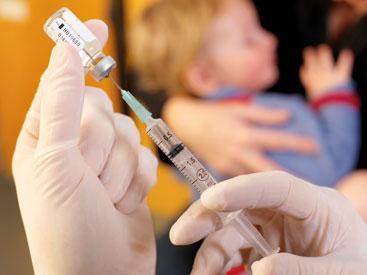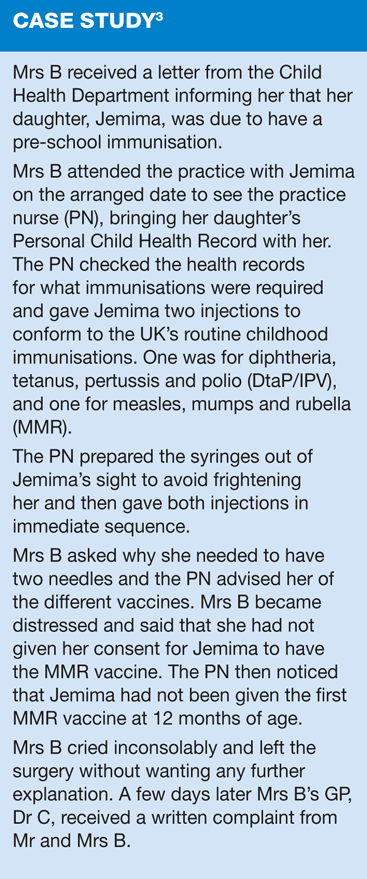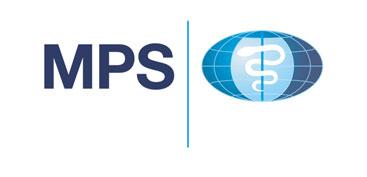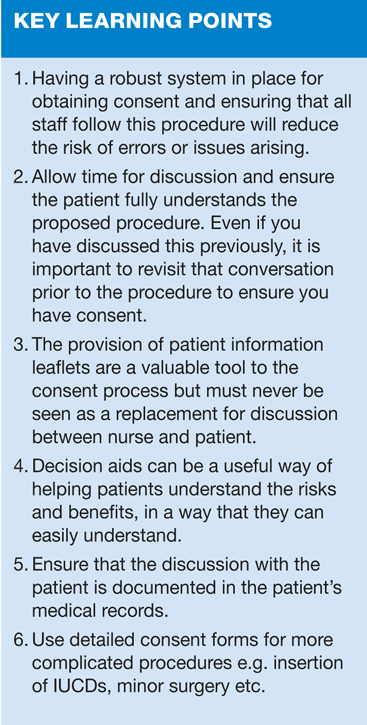Medicolegal issues: Gaining consent
Diane Baylis, RN
Diane Baylis, RN
Clinical risk manager, Medical Protection Society (MPS)
Ensuring that you gain a patient's consent before a procedure or treatment is essential. Diane Baylis, a registered nurse and Clinical Risk Manager at the Medical Protection Society (MPS), looks at why obtaining consent is important and the risks involved if you don't
Consent is a fundamental principle of medical law. The basic rule is that nobody has the right to touch anyone else without lawful excuse. If a nurse does so, it may undermine the patients' trust and could potentially lead to a clinical negligence claim, a complaint to the Nursing and Midwifery Council (NMC) or even civil or criminal proceedings for assault.
Consent is required for any medical treatment or procedure and is an agreement that the patient understands what the treatment entails and that they give their permission for it to go ahead.
EXPANDING ROLE
In 1990, the introduction of a new GP contract led to an increase in nurses working in GP practices. Since then there have been huge changes to the role of the practice nurse; now working more autonomously with increased responsibilities and undertaking a growing number of procedures/treatments such as cervical cytology, ear syringing, family planning procedures and in some cases minor surgery. Because of the increasing number of treatments and procedures that practice nurses are undertaking, obtaining consent has become more important than ever.
CLINICAL NEGLIGENCE CLAIMS
Failure to obtain valid consent for a procedure leaves the nurse vulnerable to legal claims and complaints and in extreme cases even criminal charges, although this is rare.
The NMC states that nurses have three overriding professional responsibilities when obtaining consent: 1
- To make the care of people their first concern and ensure they gain consent before they begin any treatment or care.
- Ensure that the process of establishing consent is rigorous, transparent and demonstrates a clear level of professional accountability.
- To accurately record all discussions and decisions relating to obtaining consent.
In today's society, patients are better informed and actively encouraged to be more involved in their care, which leads to higher patient expectations. It is essential that the nurse adopts a safe and systematic approach to assessing, managing risk and proactively challenging others about risk.
LEGAL REQUIREMENTS
There is no legal obligation to obtain written consent, but in many cases it is strongly advisable, especially when undertaking a minor surgical procedure or a complex treatment. Completed consent forms provide evidence that a consent process was followed, but it is important to remember that they do not necessarily constitute proof that the consent was valid. If there is a dispute over whether valid consent was obtained, the key issue will not be whether the patient signed a form, but whether they were given all the information they needed to make a considered decision. It is important to have a detailed discussion with the patient and record this clearly in their notes. If problems arise, it is easier to defend a claim if the notes are clear and up-to-date. A signed consent form can provide further evidence if legal action follows.
DOCUMENTATION
All verbal and written consent should be recorded in the patient record indicating that consent was obtained and the risks/benefits were explained:
- The nature and purpose of the procedure
- The patient is aware of the risks
- A patient information leaflet is provided (if available)
- Alternatives to the procedure have been discussed.
CAPACITY
The patient must have the capacity to make a decision relating to their treatment and have sufficient knowledge to make an informed decision. Patients should, wherever possible, be given time to consider their options before deciding to proceed with a proposed treatment. Consent is only valid when the patient has understood what they have agreed to - known as an informed consent.2
COMMON DILEMMAS
Common dilemmas experienced by practice nurses and nurse practitioners involve issues surrounding consent for childhood immunisations. Establishing parental responsibility is particularly important when administering childhood immunisations, as consent to give an immunisation must be obtained from a person with parental responsibility. Determining who has parental responsibility can be difficult, especially where parents are separated or remarried or other family members are carers.
Summary
It is vital that appropriate consent is gained before any treatment or procedure. This can be aided by developing a systematic approach, having a policy on how consent is taken, using consent forms and providing patient decisions aids4, and patient information leaflets, which will benefit the patient and clinician.
Good communication is essential for an effective relationship with the patient and is a key element in the counselling process. Even if a consent form has been signed, there should be documentation in the patient's medical notes outlining the discussion that has taken place.
The principles of consent may seem simple; however, putting it into practice isn't always straightforward.
REFERENCES
1. Nursing and Midwifery Council (2008) Code of professional conduct: standards for conduct, performance and ethics . Available at:
http://www.nmc-uk.org/Documents/Standards/The-code-A4-20100406.pdf
2. Medical Protection Society (2012) Factsheet - Consent - the basics . Available at:
http://www.medicalprotection.org/uk/england-factsheets/consent-basics
3. MPS Casebook Vol 15, No 2 , May 2007. Available at:
http://www.medicalprotection.org/mps-case-reports-vol15-may07.pdf
4. National Prescribing Centre website for decision aids. Available at:
Related articles
View all Articles



